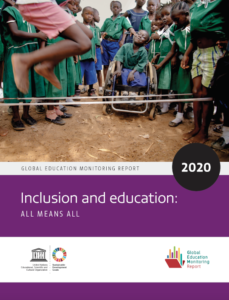UNESCO publishes the Global Education Monitoring Report 2020
 Every year, UNESCO publishes the Global Education Monitoring Report 2020 (GEM Report), in fulfillment of its mandate to monitor progress in achieving educational goals within the framework of the Agenda 2030 Sustainable Development Goals approved by the United Nations in 2015. The latest GEM Report published on June 23 assesses progress towards Sustainable Development Goal 4 of ensuring “inclusive, equitable and quality education and promoting lifelong learning for all” by 2030, identifying the different problems that countries face in providing inclusive education, and analyzing the social, economic, and cultural mechanisms that exclude or put the most vulnerable groups at risk of exclusion.
Every year, UNESCO publishes the Global Education Monitoring Report 2020 (GEM Report), in fulfillment of its mandate to monitor progress in achieving educational goals within the framework of the Agenda 2030 Sustainable Development Goals approved by the United Nations in 2015. The latest GEM Report published on June 23 assesses progress towards Sustainable Development Goal 4 of ensuring “inclusive, equitable and quality education and promoting lifelong learning for all” by 2030, identifying the different problems that countries face in providing inclusive education, and analyzing the social, economic, and cultural mechanisms that exclude or put the most vulnerable groups at risk of exclusion.
Likewise, given the current situation the world is facing due to the health crisis caused by the Covid-19, the GEM Report highlights how this problem has become evident in this context, aggravating the situations of inequality. Among the relevant data that this report shows, it is highlighted that the responses to the Covid-19 crisis, which affected 1.6 billion students, have not paid enough attention to the inclusion of all students. About 40% of low- and lower-middle-income countries have not taken any measures to support students at risk of exclusion during the crisis.
On the other hand, the aforementioned report points out that the results of inclusion in education may be difficult to define, but they are real and not illusory. “Debating the benefits of inclusive education is akin to debating the benefits of human rights. Inclusion is a prerequisite for sustainable societies. It is a prerequisite for education in, and for, a democracy based on fairness, justice and equity”.
Along these lines, this report defines the practices which can lead the process towards educational inclusion in educational policies; governance and finance; study plans, manuals and evaluations; professional training and teacher training; school management and infrastructure; and interaction of students, parents and communities with the school. It also makes recommendations, taking into account the deep roots of the obstacles and the broad scope of the problems related to inclusion, which call into question the possibilities of achieving the sustainable development goals of the 2030 Agenda.
